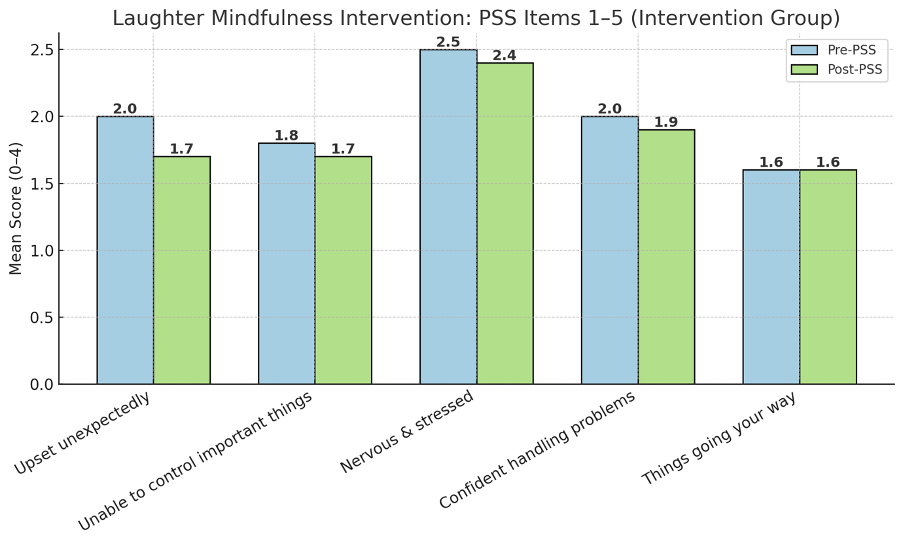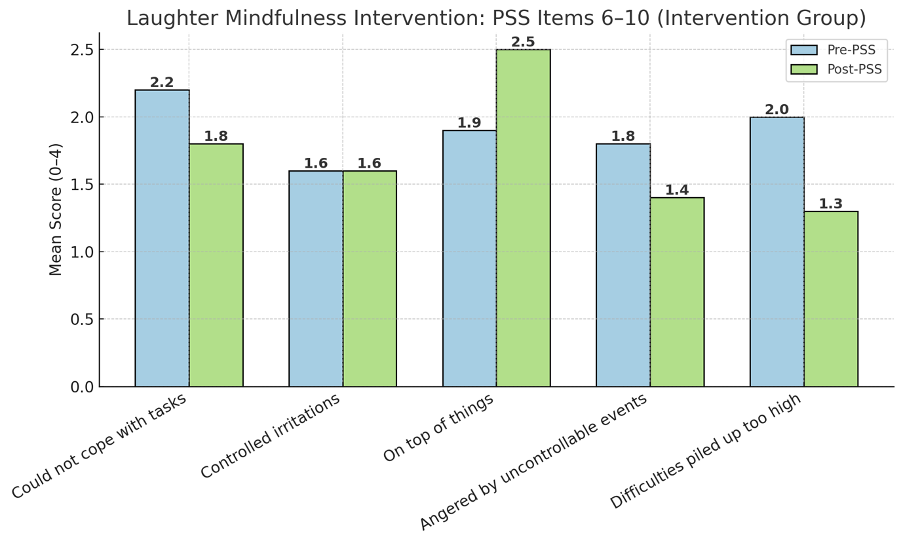
Researcher & Faculty
Author: Merissa Braza Ocampo
Institution: Fukushima Gakuin College, Japan
Discipline: English Education / Positive Psychology in Education
When & Where
Year Conducted: Spring semester, 2021
Place: Tohoku region, Japan
Participants:
-
- 75 first-year English students (23 male, 52 female)
- Age: 19–20 years
- Setting: English conversation class
Background
The COVID-19 pandemic caused high stress and anxiety for college students in Japan.
This stress reduced motivation to learn and increased feelings of isolation and uncertainty.
The researcher introduced Laughter Mindfulness Intervention (LMI), based on Laughter Yoga principles, to see if laughter could reduce stress and improve learning atmosphere.
Objectives
The study aimed to test whether LMI could help students:
- Reduce stress and anxiety
- Improve motivation to learn
- Enhance overall well-being
- Create a positive and playful classroom environment
Protocol (How It Was Done)
Step 1: Pre-Test (10th Class)
Students completed the Perceived Stress Scale (PSS) questionnaire (10 questions about daily stress).
Researcher explained the purpose and gave demonstrations of laughter exercises.
Step 2: Intervention (12th Class)
Students participated in one Laughter Mindfulness session, which included:
- Warm-up Exercises
- Rhythmic clapping, chanting “Ho Ho Ha Ha Ha,” deep breathing from the belly.
- Movement with chanting in a circle.
- Laughter Exercises
- Gradient laughter: start with chuckles, build to hearty laughter, then calm down.
- Brainwashing & flossing laugh: “cleaning” the mind with laughter.
- COVID-19 crush laugh: releasing stress about the pandemic.
- Breathing Exercise
- 3-4-5 breathing (inhale 3 sec, hold 4 sec, exhale 5 sec).
- Childlike Playfulness
- Students were encouraged to laugh at their own life stresses like a child would.
Step 3: Post-Test (13th Class)
Students completed the PSS questionnaire again.
The researcher also talked individually with some students to clarify results.
Results (What They Found)
1. Enjoyment & Acceptance
80% of students enjoyed the laughter sessions.
At first, many were shy or hesitant to laugh in front of others (a cultural aspect in Japan).
With practice, especially when “playfulness” was encouraged, students laughed more freely.
2. Stress Scale (PSS) Results
Before LMI:
-
- Top problems: Nervous & stressed (2.5/4) and Unable to cope with tasks (2.2/4).
- Many also reported unexpected upsets and feeling overloaded.
After LMI:
-
- Top positive response: Feeling “on top of things” (2.5/4).
- Stress symptoms like anger, being upset, or feeling difficulties piling up dropped significantly.
3. Physical & Emotional Symptoms
Before: Tense muscles (13%), headaches, overeating/undereating, boredom, depression.
After: Reported less frequently.
4. Observations
Male students tended to show more spontaneous laughter,
Female students often showed simulated laughter (more self-conscious).
Many admitted that they felt awkward laughing at first but eventually relaxed.
Conclusion
LMI reduced stress, encouraged positive feelings, and improved classroom atmosphere.
Laughter gave students a natural way to release nervous energy.
Some cultural barriers (shyness, fear of standing out) limited participation, but group playfulness helped overcome this.
Recommendation: LMI should be included in schools and broader communities in Japan as a simple, low-cost mental health tool.
Visualisation of Stress Scores
Here’s the Perceived Stress Scale (PSS) comparison before and after Laughter Mindfulness Intervention (LMI):
Blue = Before (Pre-PSS)
Green = After (Post-PSS)
Numbers on bars show the average score (0–4).

 In Simple Words:
In Simple Words:
This study showed that just one laughter-based mindfulness session in the classroom helped students feel less stressed, more playful, and more in control of their lives. Laughter made learning lighter, happier, and healthier.


